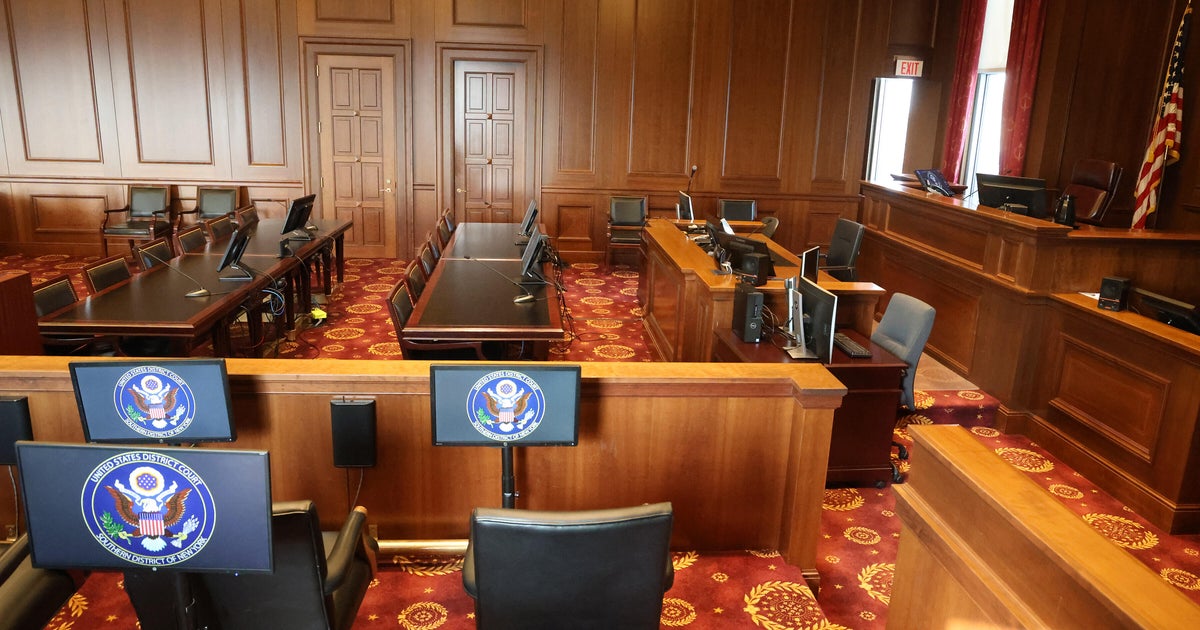Manhattan Judge Sentences Somali Pirate To More Than 33 Years
NEW YORK (CBSNewYork/AP) -- A Manhattan judge sentenced Abdiwali Abdiqadir Muse to more than 33 years in prison for being a modern-day pirate.
In handing down the sentence, Federal Judge Loretta Preska pointed to the need for a strong message of deterrence. Preska sometimes became choked up as she described the harm Muse brought to the crew aboard a merchant ship in the Indian Ocean.
She ordered Muse to serve 33 years and nine months in prison, rejecting a plea for leniency by his defense lawyers.
Before he was sentenced, Muse said he was "very sorry for what I did.''
"I got my hands into something that was more powerful than me,'' Muse said through a translator.
The U.S. government said Muse had an old-school sadistic streak. While terrorizing merchant ships on the Indian Ocean, Muse regularly aimed "his gun at the head of a hostage and pulled the trigger, laughing when the gun did not fire," federal prosecutors wrote in court papers. "Muse derived joy from the suffering of victims."
Preska rejected Muse's attempts to minimize or explain away his involvement and she noted that prosecutors had described the pirates as experienced, coordinated and ruthless. "They appeared to relish even their most depraved acts of physical and psychological violence,'' she said, noting that the pirates had conducted a mock execution of the captain during the several days they held hostage.
Before the sentence was announced, 44-year-old crew member Colin Wright told the judge he was ``not the same person I used to be and I never will be.'' He complained that security still has not been improved much for ships traveling near Somalia.
"I'd like to see something done about that,'' he said.
Muse's involvement in a brazen high-seas attack on a U.S.-flagged vessel and the dramatic rescue of the ship's kidnapped captain in 2009 made him an instant symbol of a 21st-century brand of piracy targeting shipping routes off the coast of Africa -- and of stepped-up efforts to punish offenders through 19th-century maritime laws.
Do you think Muse should get the maximum sentence? Let us know below!
Late last year, a Virginia jury found five other Somali men guilty of exchanging gunfire with a U.S. Navy ship off the coast of Africa. Scholars called it the first piracy case to go to trial since 1861 during the Civil War, when a New York jury deadlocked on charges against 13 Southern privateers.
Aside from the novelty of his case, Muse became a curiosity because he defied swashbuckler stereotypes: The boyish, 5-foot-2 defendant has often looked bewildered in court and sometimes wept. Following his capture, his lawyers insisted he was 15 and should be tried as a juvenile; prosecutors convinced a judge he was at least 18.
In a guilty plea last year, Muse told a judge he was "very, very sorry about what we did."
Prosecutors branded Muse the ringleader of a band of armed pirates who commandeered at least three ships and kidnapped dozens of sailors. The last attack was on the Maersk Alabama on April 8, 2009, as it transported humanitarian supplies about 280 miles off the coast of Somalia, an impoverished East African nation of about 10 million people.
Muse was the first to board the 500-foot ship, firing his AK-47 assault rifle at the captain, Richard Phillips, prosecutors said. He ordered Phillips, of Underhill, Vt., to halt the vessel and then held him hostage for several days on a sweltering, enclosed lifeboat that was soon shadowed by three U.S. warships and a helicopter.
The English-speaking Muse taunted Phillips by threatening to "bury him in a shallow area of the ocean" and by telling his captive he "liked having hijacked an American ship and wanted to kill Americans," the government's court papers said.
The siege ended when Navy sharpshooters on the USS Bainbridge picked off the three pirates in a stunning nighttime operation, leaving Phillips untouched.
(TM and Copyright 2011 CBS Radio Inc. and its relevant subsidiaries. CBS RADIO and EYE Logo TM and Copyright 2011 CBS Broadcasting Inc. Used under license. All Rights Reserved. This material may not be published, broadcast, rewritten, or redistributed. The Associated Press contributed to this report.)







